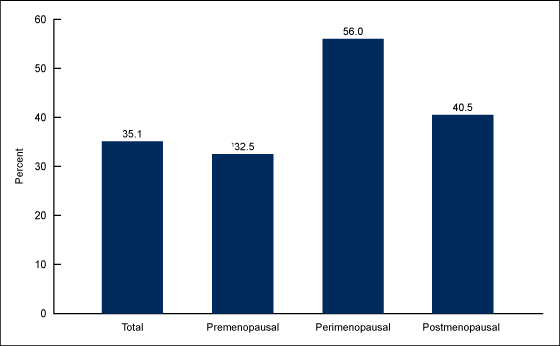Sleep Duration and Quality Among Women Aged 40-59, by Menopausal Status
Posted on byQuestions for Anjel Vahratian, Ph.D., Author of “Sleep Duration and Quality Among Women Aged 40-59, by Menopausal Status”
Q: What made you decide to conduct this study on sleep duration and sleep quality for this group of women?
AV: My research focuses on the health of women as they age and transition from the childbearing period. During this time, women may be at increased risk for chronic health conditions such as diabetes and cardiovascular disease. As insufficient sleep is a modifiable behavior that is associated with these chronic health conditions, I wanted to examine how sleep duration and quality varies by menopausal status.
Q: Was there a finding in your new study that surprised you, and if so, why?
AV: I was surprised to learn that nearly one in two women aged 40-59 did not wake up feeling well rested four times or more in the past week and that postmenopausal women aged 40-59 were more likely to experience disruptions in sleep quality compared with premenopausal women in the same age group.
Q: How did the women from your survey track their sleep behavior; for example, did they use a wearable sleep tracker?
AV: In this report, information on sleep duration and quality are based on self-report. Trained interviewers asked survey participants on average, how many hours of sleep did they get in a 24-hour period. In addition, they asked participants to recall how many times they had problems falling asleep and staying asleep and how many days they woke up not feeling well rested in the past week.
Q: In addition to menopausal status, do you have any other lifestyle information that could impact women’s sleep quality for this age group; for example, shift work employment or having infants or very young children in the home?
AV: While this report did not specifically look at other lifestyle factors that could affect women’s sleep duration and quality – other than age and menopausal status — my colleagues released a report in January 2016 on sleep duration and quality by sex and family type. This report looked at the presence of young children in the household. In addition, we have produced estimates of sleep duration and quality across several sociodemographic characteristics such as race and ethnicity, education, poverty status, marital status, and region.
Q: This report seems to offer just a single year of data – 2015; do you have any trend data to compare these findings to previous years, or any newer data?
AV: Unfortunately, we do not have any long-term trend data on sleep duration and quality among women aged 40-59 by menopausal status. The National Health Interview Survey, or NHIS, has included questions on sleep duration and quality since 2013, while the questions on menopausal status were a part of the 2015 NHIS cancer control supplement.
Q: What is the take-home message from this report?
AV: I think the real take-home message of this report is that sleep is critical for optimal health and wellbeing, and it is a modifiable risk factor for diabetes and cardiovascular disease. As sleep duration and quality vary by menopausal status, it is an area for targeted health promotion for women at midlife.
Posted on by


